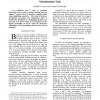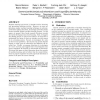978 search results - page 15 / 196 » Knowledge, Probability, and Adversaries |
150
click to vote
CTRSA
2011
Springer
14 years 5 months ago
2011
Springer
Non-malleability of a cryptographic primitive is a fundamental security property which ensures some sort of independence of cryptographic values. The notion has been extensively st...
108
click to vote
IJCNN
2008
IEEE
15 years 8 months ago
2008
IEEE
─Humans have a drive to maximize knowledge of the world, yet decision making data also suggest a contrary drive to minimize cognitive effort using simplifying heuristics. The tra...
110
click to vote
TIME
1994
IEEE
15 years 6 months ago
1994
IEEE
We describe a discrete time probabilitylogic for use as the representation language of a temporal knowledge base. In addition to the usual expressive power of a discrete temporal ...
97
Voted
IEEESCC
2005
IEEE
15 years 7 months ago
2005
IEEE
In this paper, we introduce and explore a new computing paradigm we call knowledge as a service, in which a knowledge service provider, via its knowledge server, answers queries p...
114
click to vote
CCS
2008
ACM
15 years 3 months ago
2008
ACM
Machine learning has become a valuable tool for detecting and preventing malicious activity. However, as more applications employ machine learning techniques in adversarial decisi...


